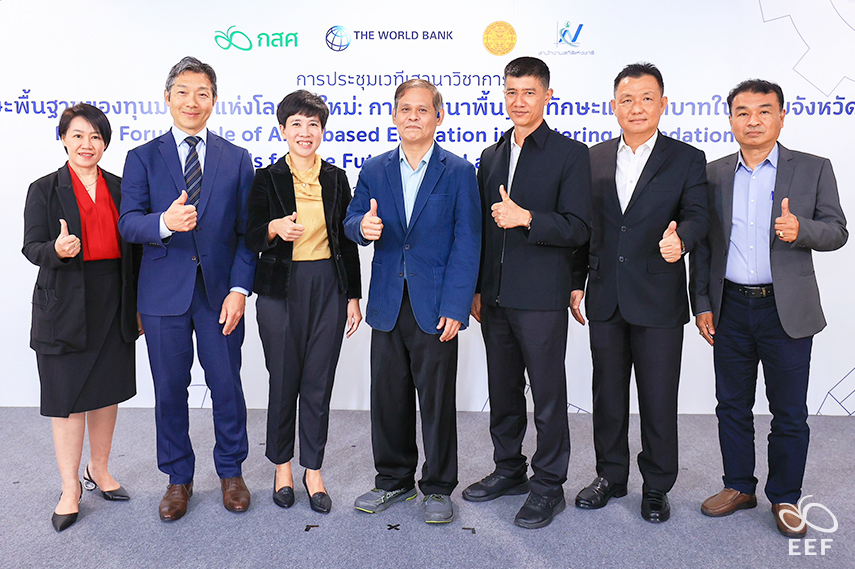
Bangkok, May 29 2023 — The Equitable Education Fund (EEF) Thailand, in partnership with the World Bank, Thammasat University, and the National Statistical Office, organized the 3rd Policy Forum focusing on the Role of Area-based Education in Fostering Foundational Skills for the Future Thai Labor Market on Monday, May 29th, 2023, at the EEF. This forum provided a platform for policymakers, education experts, and regional representatives to engage in meaningful discussions and explore practical strategies for enhancing the roles of area-based education in fostering foundational skills in the ever-evolving Thai labor market. Focusing on the provincial level, the forum sought to address local challenges and foster inclusive education development throughout Thailand.
The forum saw the active involvement of diverse stakeholders, such as government agencies, private sector entities, academic institutions, and media organizations, all of whom played a vital role in tackling educational disparities and promoting the growth of Thai youth and the workforce. Moreover, local and provincial authorities were present at the event. The forum featured presentations on global examples of provincial-level skill development and roles, as well as discussions and knowledge sharing among policymakers, education experts, and representatives from different regions.
The EEF has joined forces with the World Bank, Thammasat University, and the National Statistical Office to establish academic cooperation for enhancing Thailand’s human capital development in the digital era. Through the “Adult Skills Assessment in Thailand” research initiative, they seek to understand and address challenges in developing provincial-level foundational skills, with a focus being placed on the significance of such skills in reducing socio-economic disparities. Policy recommendations and collaboration efforts are proposed to empower Thailand’s labor force, enabling them to transcend the middle-income trap and enhance their quality of life. By tackling intergenerational poverty and various dimensions of inequality, this initiative aims to position Thailand as a high-income nation. The successful collaboration has culminated in three Policy Forums, with the latest focusing on area-based education’s role in developing foundational skills for Thailand’s future labor market.
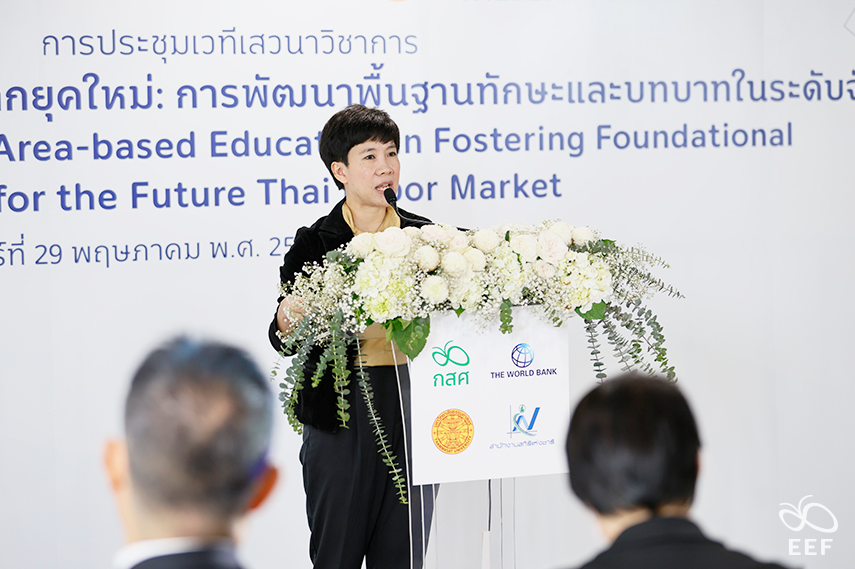 Ms.Thantida Wongprasong, the Director of the Office of Innovation for Learning Opportunity,
Ms.Thantida Wongprasong, the Director of the Office of Innovation for Learning Opportunity,
Equitable Education Fund (EEF) Thailand
Ms.Thantida Wongprasong, the Director of the Office of Innovation for Learning Opportunity, Equitable Education Fund (EEF) Thailand, delivered an opening remark on its collaboration with the World Bank within the framework of the “Adult Skills Assessment in Thailand” initiative, stating: “On behalf of the Equitable Education Fund (EEF) Thailand, we would like to extend our sincere appreciation to all participants of today’s Policy Forum on the Role of Area-based Education in Fostering Foundational Skills for the Future Thai Labor Market. This forum concludes the academic discourse, preceding the forthcoming dissemination of survey data from the ‘Adult Skills Assessment in Thailand’ project. Since 2020, the EEF and World Bank have been collaborating to design and evaluate workforce skills and readiness in alignment with market demands. Our focus has been on adults with low skills and disadvantaged labor groups, following globally accepted guidelines for cross-country comparisons.
“Furthermore, we have aimed to formulate comprehensive policy recommendations, strategies, and educational reforms that uplift adult workforce skills while preparing Thailand for the advent of disruptive technology and impending shifts in labor market requirements. This project has seen international experts collaborate with Thai scholars to enhance surveys on reading, digital skills, and emotional and social competencies. We are grateful for the support and guidance provided by various government agencies, including Thammasat University and the National Statistical Office. With a sample size of 8,776 individuals from 45 provinces and encompassing key six regions, we have categorized the data according to target groups, ensuring that our questionnaire meets the needs of data users and enables technically informed policy recommendations.”
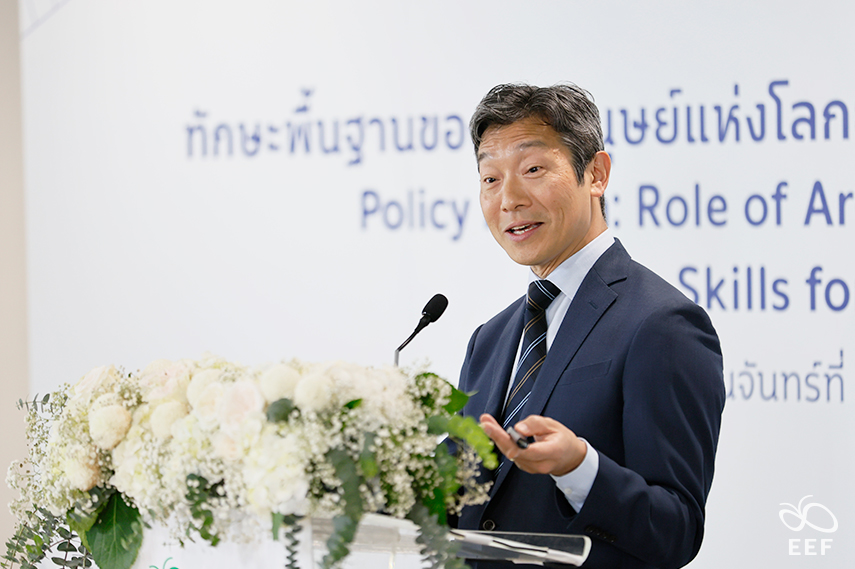
Mr. Koji Miyamoto, Senior Economist, Education Global Practice, East Asia and Pacific Region, World Bank
Mr. Koji Miyamoto, Senior Economist, Education Global Practice, East Asia and Pacific Region, World Bank, started by giving a presentation on the topic of “Fostering Foundational Skills in Thailand: the Role of Provinces and Cities.” He stated the meaning of foundational skills, “Foundational skills are fundamental, progressive, and transferable abilities that allow individuals to navigate in an environment that can be innovative, transformative, and fast evolving as well as devastating, uncertain, and unpredictable.” In addition, he also gave a case study on how can provinces use the report information from case studies of the USA that have established the Learning standard that includes diverse dimensions of Social and Emotional Skills that cover from primary until adulthood, Singapore introduced experiential learning in pre-service teacher training programs in 2010, and many more.
Today’s discussion centers around aligning national-level strategies with localized efforts to meet the labor market demands in different regions. Thailand’s labor market requires diverse skills, including reading, analytical, digital, social, and emotional competencies, to succeed in the New S-curve industries and BCG economy. Thailand faces two pressing challenges in its education and labor market landscape: disengaged youth and demographic changes. There is a concerning number of disengaged youth who have dropped out of the education system, along with a significant group of NEET (Not in Education, Employment, or Training) individuals. Research conducted by UNICEF revealed that approximately 1.28 million NEET individuals exist in Thailand, with 68.2% lacking both readiness for employment and the motivation to develop additional skills. This NEET issue is closely linked to school dropout rates and youth unemployment, and failing to reintegrate these individuals into the labor market will have adverse effects on their livelihoods and hinder economic development at both the local and national levels.
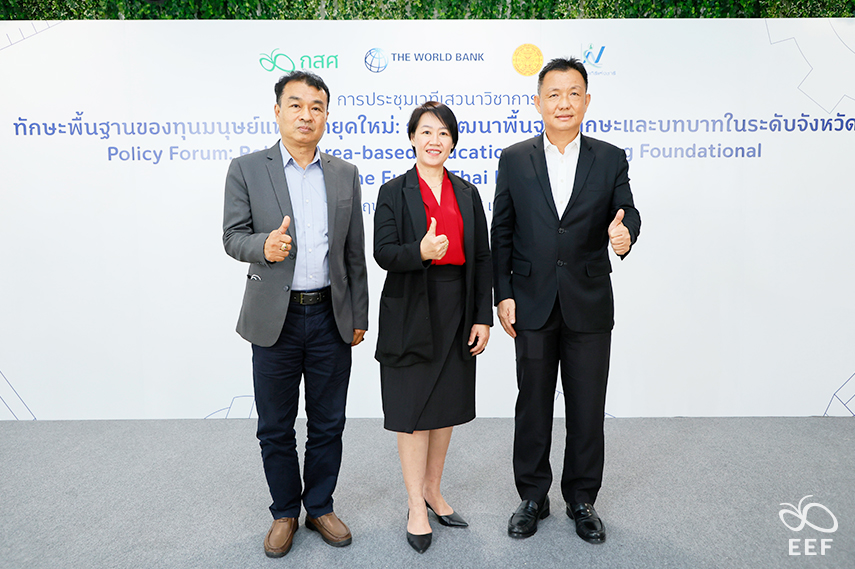 Mr. Charoenlak Phetpradab, Secretary, Khon Kaen Community For the Future Foundation
Mr. Charoenlak Phetpradab, Secretary, Khon Kaen Community For the Future Foundation
Asst. Prof. Dr. Wiyada Lemtrakul, Dean of the Faculty of Education, Lampang Rajabhat University
Mr. Somsak Paniengtong, Committee for Area-based Learning Development in Rayong Province
Additionally, Thailand is experiencing demographic changes as it transitions to an aging society, resulting in a decline in the working-age population that has negative implications for economic growth. According to a World Bank survey in 2022, these demographic changes are projected to reduce Thailand’s GDP growth per capita by 0.86% between 2024 and 2034, reinforcing the country’s middle-income status. Addressing the Not in Education, Employment, and Training or NEET issue, encompassing out-of-school and unemployed youth, is vital for individuals and the country’s economic development. Furthermore, the challenges of an aging society and a declining working-age population underscore the need to bridge the skills gap and adapt to demographic changes for sustained economic progress at regional and national levels.
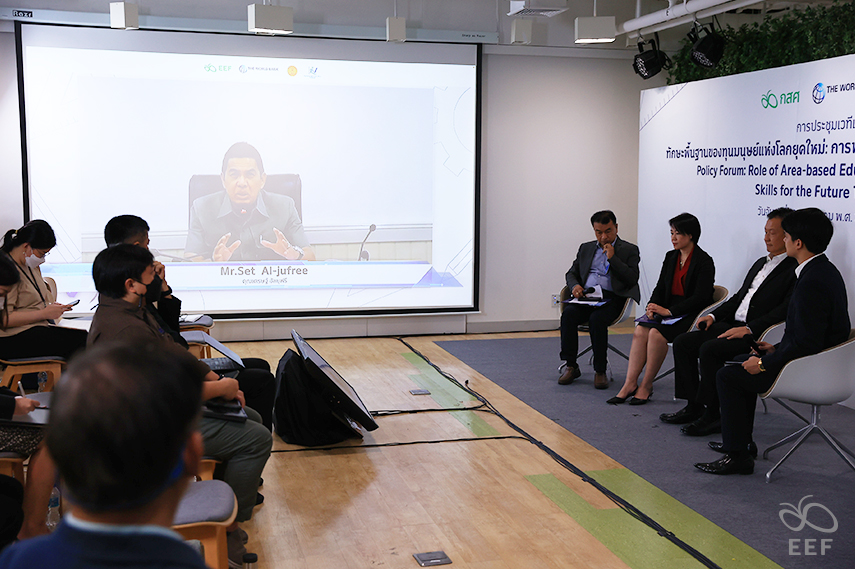 Mr.Set Al-jufree, Governor, Pattani Provincial Administrative Organization
Mr.Set Al-jufree, Governor, Pattani Provincial Administrative Organization
Moreover, during the panel discussion under the topic of “Developing Foundational Skills and Roles at the Provincial Level in Thailand,” different experts from provinces in Thailand represent such as Pattani, Lampang, Rayong, and Khon Kaen exchanged and share viewpoints on the current sign of skills shortages in provinces, the evidence information or guidance note that can help develop the foundational skill programs, and the partnership within the province from different sectors. Overall, the points have been raised and acknowledged with a sample of practices. The panelist including Mr.Set Al-jufree, Governor, Pattani Provincial Administrative Organization, Asst. Prof. Dr. Wiyada Lemtrakul, Dean of the Faculty of Education, Lampang Rajabhat University, Mr. Somsak Paniengtong, Committee for Area-based Learning Development in Rayong Province, and Mr. Charoenlak Phetpradab, Secretary, Khon Kaen Community For the Future Foundation.
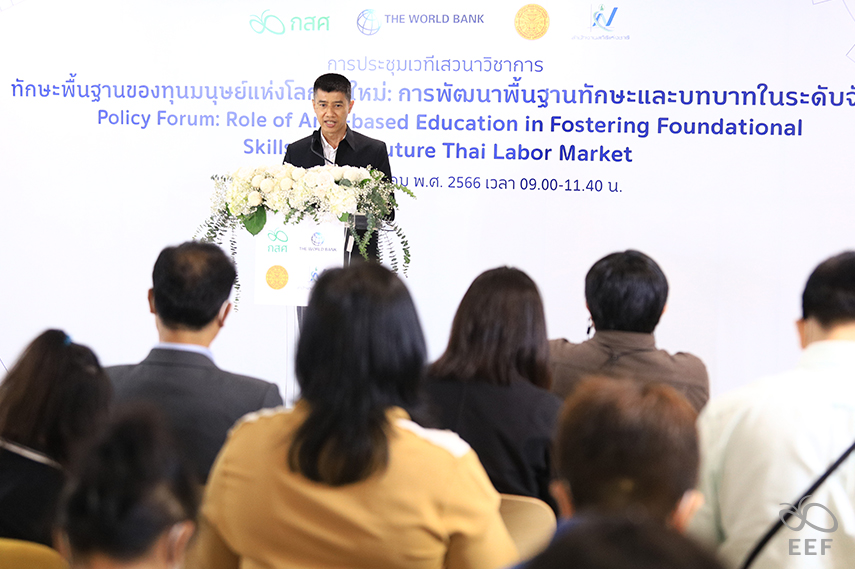 Mr. Patanapong Sukmadan, Assistant Managing Director, Equitable Education Fund (EEF) Thailand
Mr. Patanapong Sukmadan, Assistant Managing Director, Equitable Education Fund (EEF) Thailand
Mr. Patanapong Sukmadan, Assistant Managing Director, Equitable Education Fund (EEF) Thailand concluded the policy forum with a closing remark on the importance of fundamental skills and the future implementation of strategies to uplift underprivileged labor groups and enhance social-emotional competencies in vocational education institutions, stating: “The Policy Forum on the Role of Area-based Education in Fostering Foundational Skills for the Future Thai Labor Market highlighted the importance of human capital’s foundational skills, such as reading, analytical, digital, and social and emotional competencies, in fortifying all professions and improving quality of life with economic and societal returns. We are actively collaborating with the stakeholders to implement targeted measures that enhance these skills among disadvantaged labor groups within each interested population. As a next step, we will organize a dissemination meeting to present the findings from the ‘Adult Skills Assessment in Thailand’ research project, where the stakeholders will provide valuable feedback, propose implementation strategies, and identify future research directions to uplift the foundational skills of the underprivileged labor force.
“Additionally, our collaboration extends beyond this project, with the World Bank conducting localized surveys using a questionnaire developed with Thai experts in participating provinces, aiming to address disparities and effectively manage education at the local level. We will carry out activities to enhance social-emotional competencies among students in vocational education institutions participating in the high-level career innovation program. I hope that our future endeavors in this project will involve close cooperation with local authorities and educational institutions to apply the developed guidelines for the country’s workforce development, particularly for the disadvantaged labor groups in need of urgent support.”
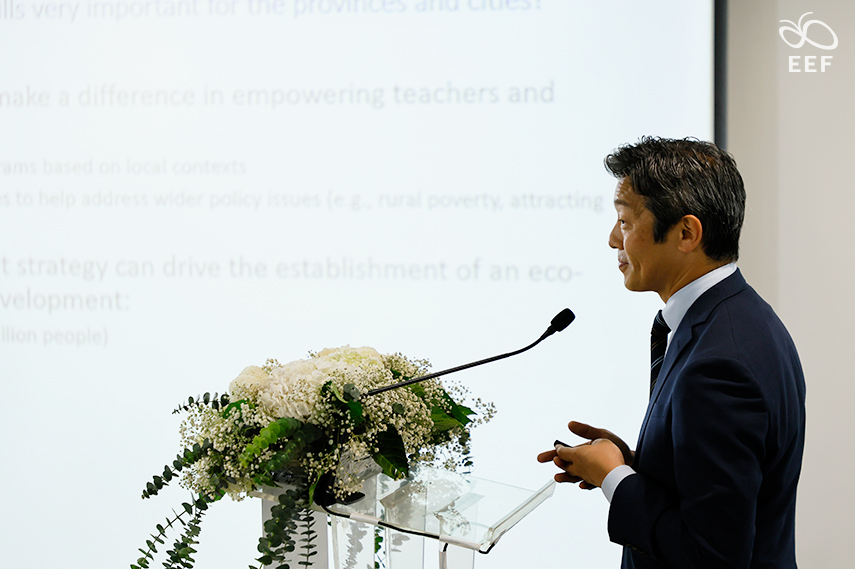
In addition, by the end of 2023, the launch report of Adult Skills Assessment in Thailand will be held with the presents a message to policymakers and educators who believe in the power of education and training to strengthen Thai citizens’ ability to face the challenges and opportunities of the 21st century. It argues that foundational skills lie at the center of this ability. Foundational skills are fundamental, transferable, and progressive human abilities that allow individuals to solve everyday problems. The report has 3 objectives.
- To demonstrate the scale, nature, and costs of the foundational skills crisis that Thailand is currently facing.
- To provide an overview of how the government, employers, as well as education and training institutions, are responding to this predicament by introducing reforms, preparing instruments to facilitate learning, and delivering programs to foster foundational skills.
- To provide a way forward for Thailand to build an effective, equitable, and sustainable ecosystem of foundational learning, which can be driven by establishing a learning society.
The report demonstrates how skills-driven reforms have the power to drive productivity and innovation, which will in turn have an impact on investments and help bring Thailand out of the middle-income trap.
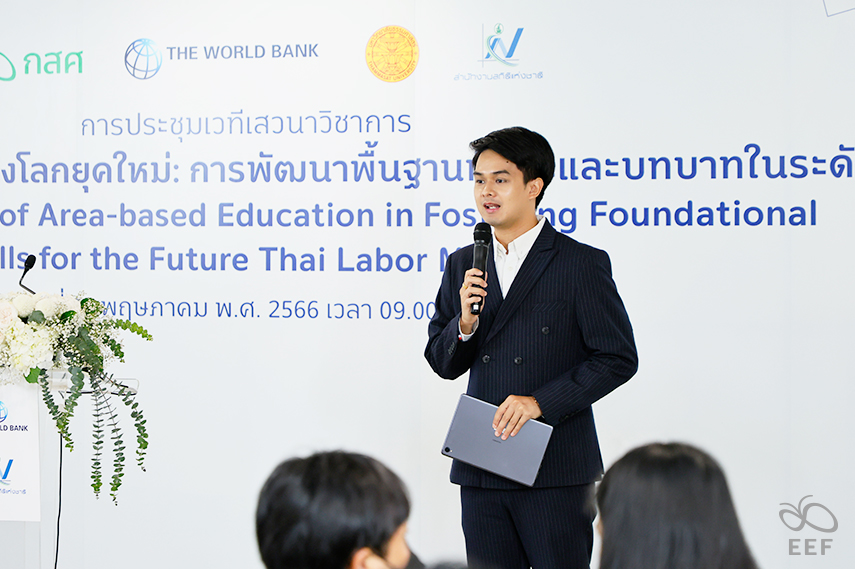 Mr. Kamonthon Komarathat
Mr. Kamonthon Komarathat
The Equitable Education Fund (EEF), in Thailand, is an organizational body operating under the supervision of the Prime Minister. Established under the Equitable Education Act of 2018, its mission is to provide financial support for underprivileged children and youth, address educational inequality through partnerships, and conduct research to enhance teacher effectiveness. The EEF strives to ensure that individuals receive education and development opportunities, guided by research-based policies and collaborative goal-setting for widespread impact.
Remark:
Event Record – Here

